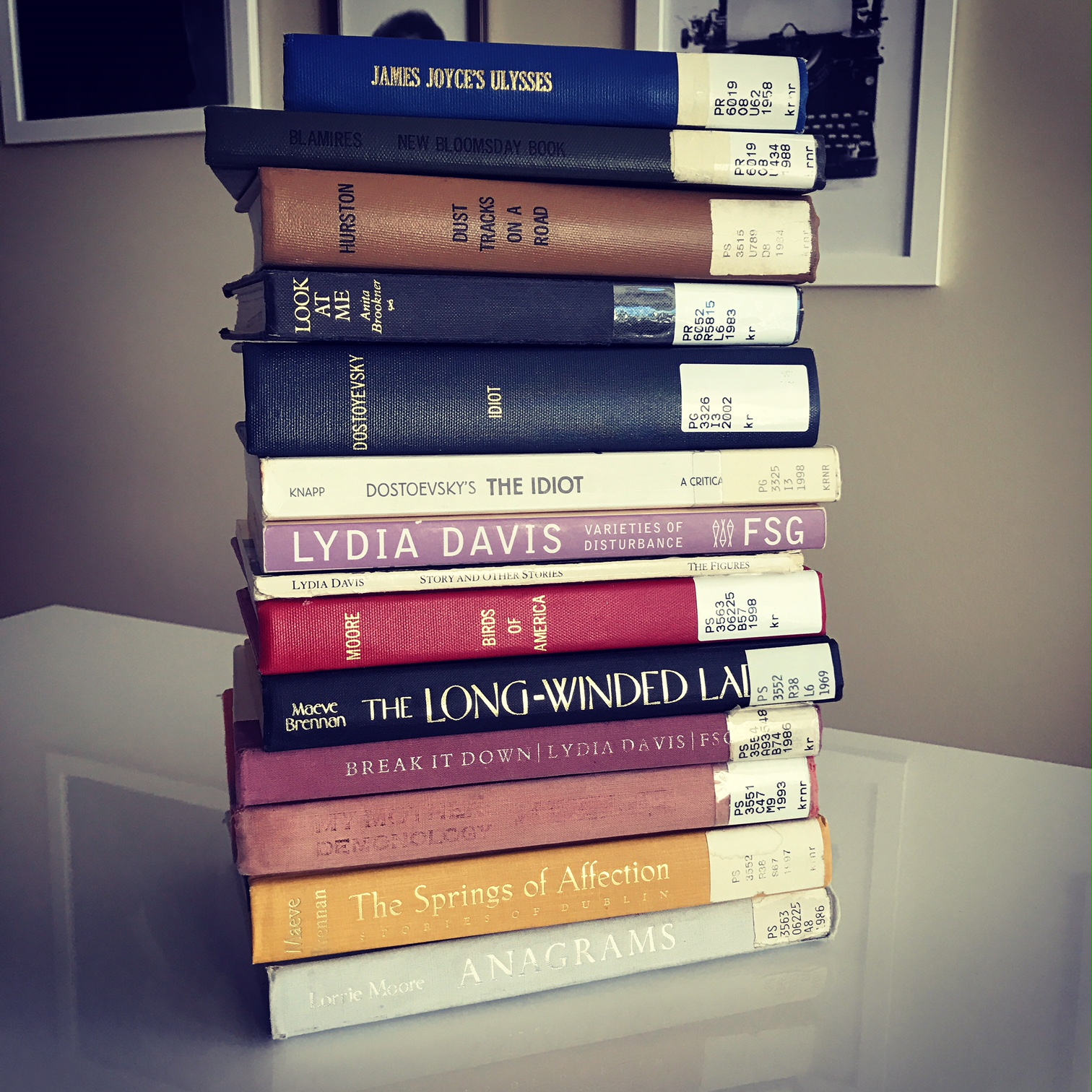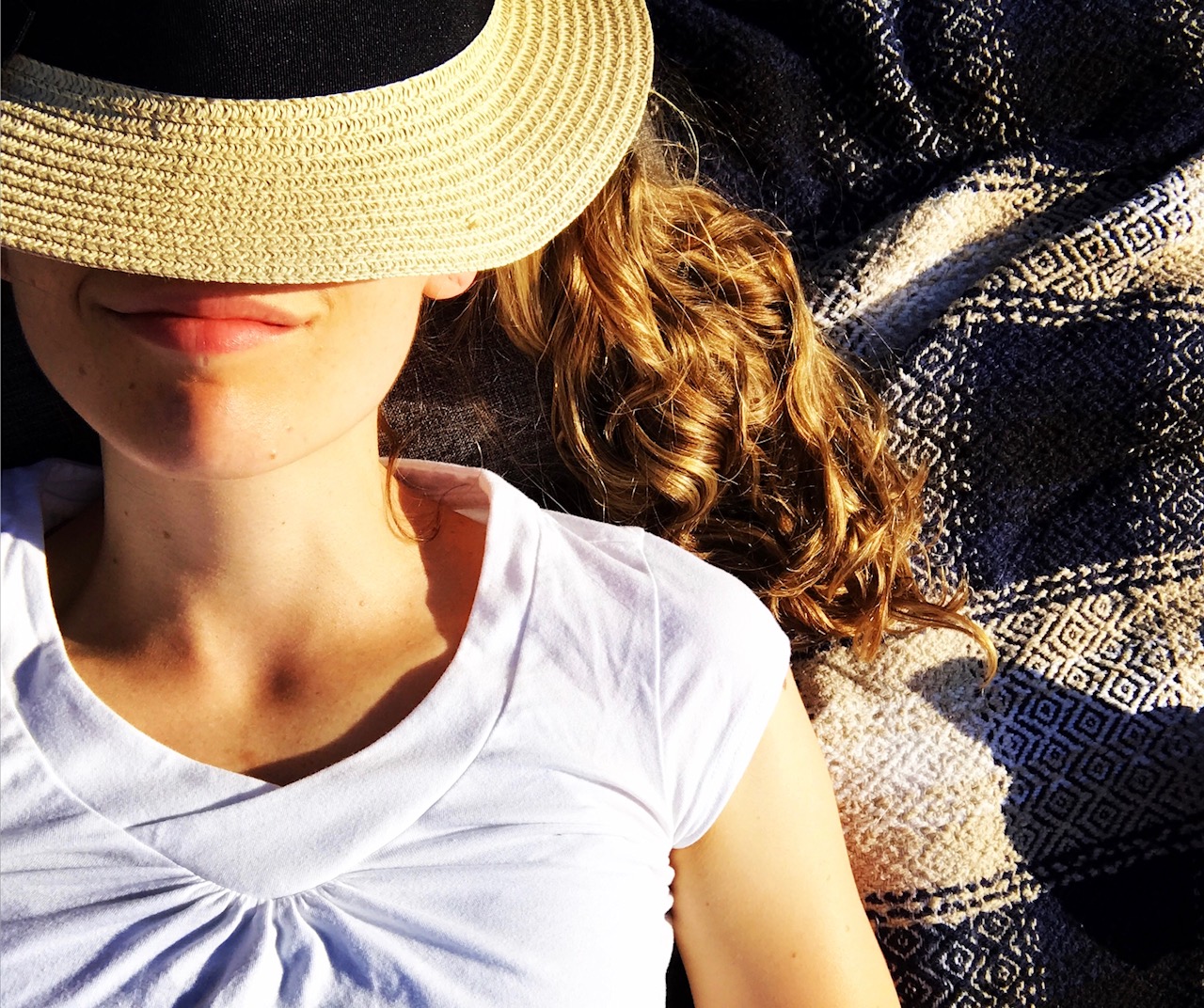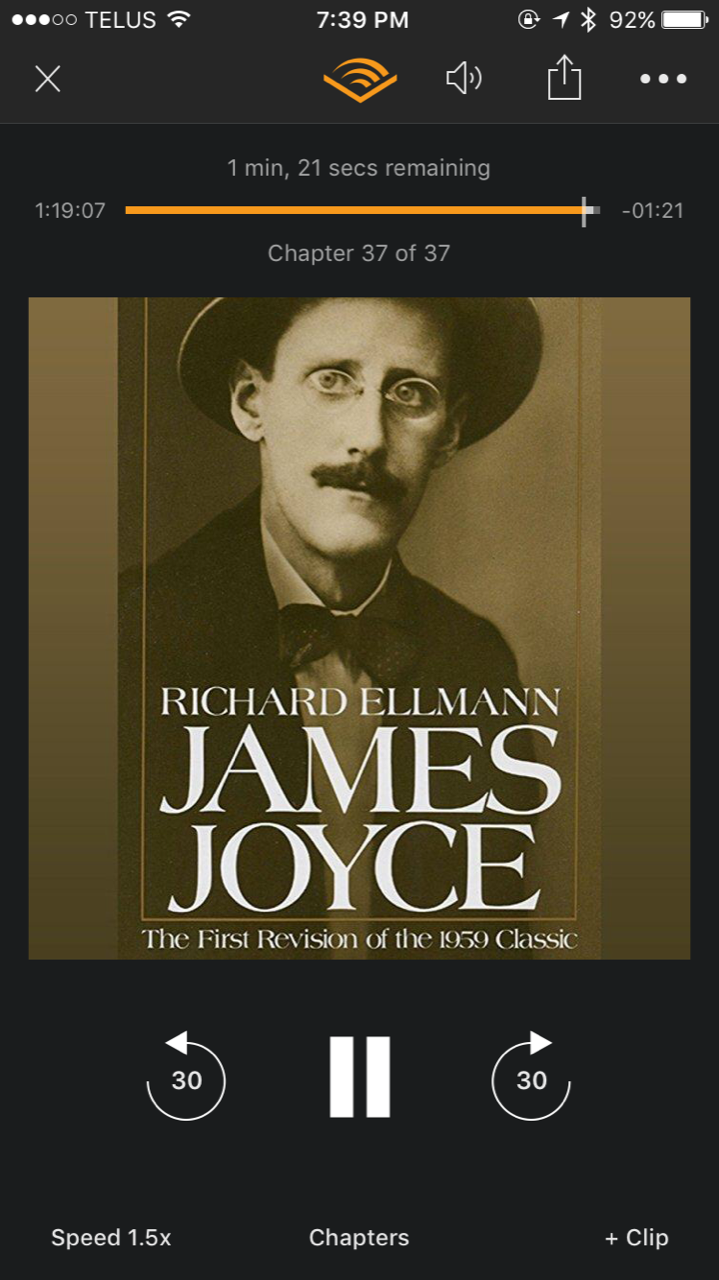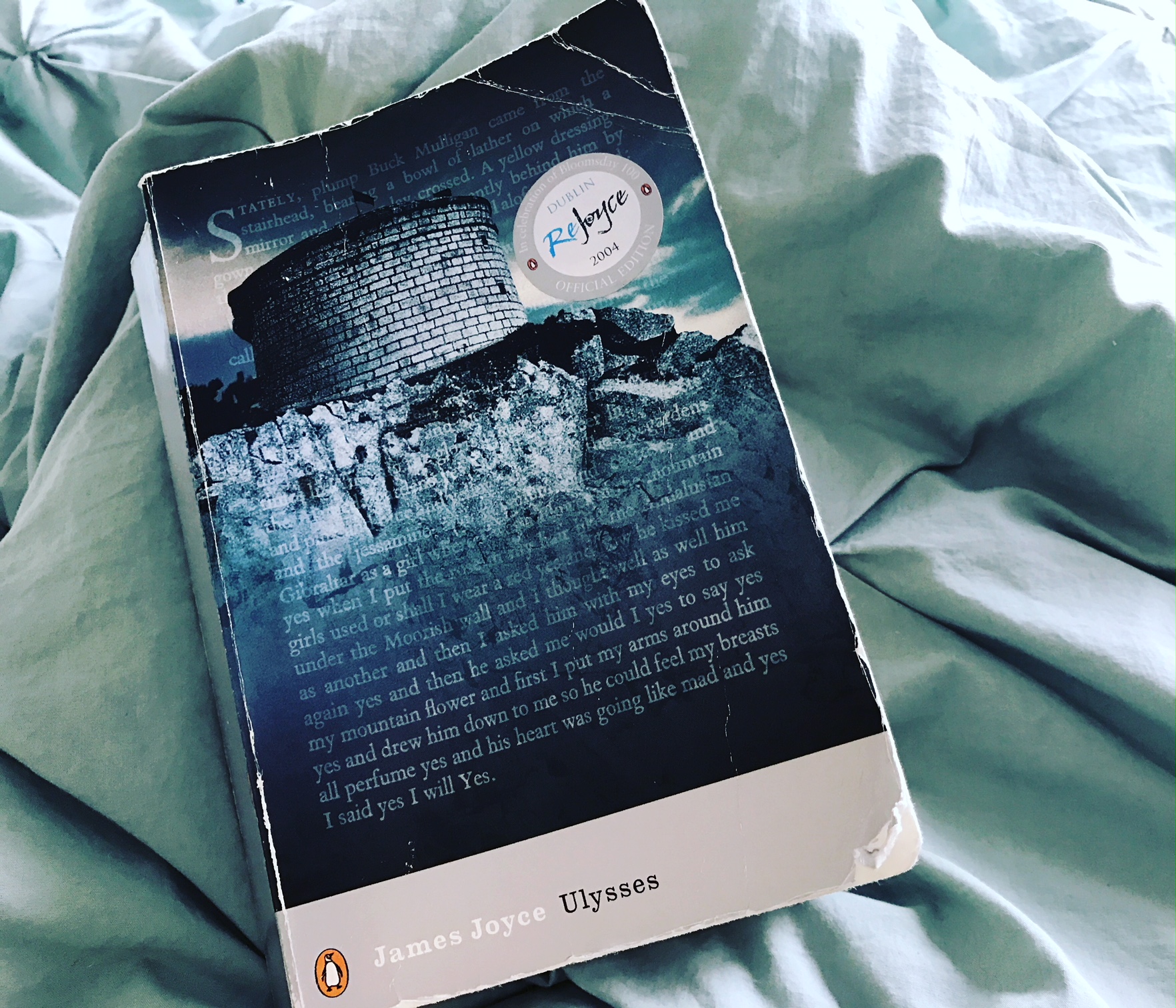My Reading Year: What I Learned from Reading 275 Books in 365 Days
By A.H. Reaume
The other day I told a friend that I'd read 275 books in 2018 and he responded by laughing and declaring emphatically, "That's a reading year!"
I think that's an excellent way to describe my past year. I didn't set out to read so many books – although I do generally read quite a lot. For comparison, I read 140 books in 2017 which included some extremely long books like Ulysses, Les Miserable, all of Proust’s In Search for Lost Time series, Anna Karenina, War and Peace, and Moby Dick.
(Okay, fine – by ‘I read a lot’ I actually mean I read a downright ‘excessive’ amount of books).
This past year has been extraordinary, in part, because of every one of the 275 books that I’ve read. But for many reasons, I wish I hadn't read so much. After all, this year wasn't supposed to be a reading year. It was supposed to be a travelling year --only I had to cancel a trip to Dublin to celebrate Bloomsday in June and a trip to New York in September. It was also supposed to be an activism year--but I had to delay starting a non-profit that I had been planning to launch.
2018 became a reading year because, for much of the year, my body didn't let me do much else. I spent most of March barely able to leave my bed other than to go to work. I read over 40 books in August because I was once again largely confined to my home.
You might be wondering why 2018 saw me in such bad health. I was still recovering last year from a concussion I got in May 2017 when I dropped a weight on my head. I usually call it a ‘head injury’ or ‘mild traumatic brain injury’ these days since ‘concussion’ evokes for many people a week or two of rest followed by a return to normal life.
But I couldn’t walk properly after I was injured. I had severe balance issues and needed intensive physiotherapy. Once I could reliably walk again, I wasn’t able to talk while walking for over two months. My brain just couldn’t process both things at once. For four months, I wore sunglasses indoors and had to lie down for an hour or more after doing something as simple as taking a shower. I wasn’t able to leave my house much and had to limit the number of visitors I had because talking exhausted me and being in the presence of others overstimulated my brain.
But, as a writer, what was perhaps most distressing was that I couldn’t use screens for more than half hour at a time for months. I was trying to edit my first novel and had to put that aside.
It was an isolating time-- and a time that I wouldn’t have gotten through without books. During the three weeks of complete bedrest following my injury, I listened to 200 hours – around eight full days-- of audiobooks. I remember listening to Richard Ellman’s biography of James Joyce and writing down notes one line at a time because that’s all I could handle. Before my injury, I’d been in the midst of researching a project connected to Joyce’s Ulysses and had already filled up three notebooks with ideas. As I lay unmoving in my darkened bedroom, the voice of the narrator kept mind-numbing boredom at bay.
But what helped most was knowing that despite the brain fog and dyslexia-like symptoms I was experiencing, I could still follow the narrative thread of the biography and I still experienced flashes of insight. Ideas for my project still sprung up. I could synthesize and understand complex literary concepts.
Your CanLit News
Subscribe to Open Book’s newsletter to get local book events, literary content, writing tips, and more in your inbox
My ability to think deeply and critically about literature-- the thing that had gotten me through my MA in English Lit and that was the backbone of my fiction writing – still worked. My brain might be glitching and might process things a little slower, but it’s capacity for deep thought hadn’t been permanently affected. I knew people who had lost that after a brain injury and that had been my biggest fear. But listening to audiobooks during that time gave me hope.
Books became the breadcrumbs I followed out of the forest of my brain injury. Reading was sometimes the only thing my body allowed me to do. And while I often got sick of listening to books, I never stopped being grateful that my injury didn’t take literature from me.
“I don’t know what I would do if I couldn’t read,” I told a friend in tears after a particularly difficult day when I hadn’t been able to even listen to audiobooks. “I don’t know who I would be without books. Reading… writing… it’s so much a part of who I am.”
When 2018 started, I was 8 months out from my injury. I’d returned to work two months before. My capacity to use screens had improved, but by the time I got home from work I was often maxed out. I couldn’t watch TV. I was too tired to workout or spend time with friends. Books weren’t just my preferred solution to the problem of what to do with my time—they were once again the only one available. So, I read. And read. And then I read some more.
People often ask me about the logistics of my reading year. How did I do it? they wonder. Where did I find the time? I will share my secret with you – around half of the books I read were audiobooks. Since I am a fairly fast reader, I find that listening to audiobooks at normal speed is too slow, so I’ve gradually increased it until I listen to them at 2 times the speed. I don’t know if I’ve always been an auditory learner, but I’ve definitely become one since my injury. I feel like I can ‘read’ and analyze an audiobook text almost as well as I can a hard copy.
So, what about the other half of the books I read? You can read a lot of books when you’re too fatigued and weak to leave your bed and you have no other options for how to spend your time. When I did start feeling better throughout the year, my physiotherapist had me working out every day to increase my stamina. But then I read on the treadmill—sometimes for an hour a day.
I don’t think I’ll ever read as many books in a year again. I rarely ever experience that kind of fatigue anymore and so I’m starting to see my monthly reading numbers decrease. In fact, I hope I never read that many books in a year again. I would much rather spend some of that time writing or travelling or enjoying it with friends.
But I can’t say that I regret reading so many books in 2018. As I reflect back on my reading year, I feel an incredible sense of gratitude for that time to read and absorb so many of the works of others. I also know this past year will pay dividends in my writing. Since I read a lot of contemporary fiction, I feel like I have a unique perspective about where the novel seems to be headed and how my own current and future novels might play into that evolution. I’m excited by the ways in which novelists are playing with form or finding ways to participate in larger conversations through their works.
As a writer, reading isn’t just entertainment, it’s also an education. Seeing how other writers tell stories isn’t just instructive, it’s been inspirational. It’s made my book ideas richer and more complex. It’s connected me with traditions and new experiments in fiction that I never would have known about otherwise. It’s opened up the possibilities for me for what fiction and non-fiction can be and do.
But at the most personal level – these books also comforted me and kept me from feeling alone. They didn’t just occupy my time, but they also helped me connect with a community of readers. After all, some of my first forays out of my house after my concussion were to go to book club meetings.
Before I was injured, I’d gone religiously to twice monthly book club meetings and one of the fellow members went out of his way to pick me up and drive me when I was able to go out for short periods in public again. For months, this was the only time I left my house other than for medical appointments or to do physio.
It gave me a chance to see friends and to finally talk about the books that I’d been reading. My thoughts came out slightly slower than they used to and I sometimes had to close my eyes so that I could process what I was thinking better. But book club gave me a chance to laugh and joke and pretend like I was okay—like I wasn’t confined to my home and easily fatigued and lost in brain fog most of the time.
“I told my wife about you,” a new member named Paul said to me during his second session. “I said –there’s this girl in the book club who has the most insightful and thought-provoking things to say about books. She just knows so much about literature. I told her how exciting it was to hear your thoughts about the last book.”
I smiled at him. My eyes filled with tears.
“I’m recovering from a brain injury,” I told him. “I’m not at my best.”
He looked momentarily confused. “I would never have known,” he said, distress rising in his voice. “I’m so sorry to hear.”
Paul’s comment meant everything to me. Within the maze of my disability and recovery where I felt so much had been taken away from me, he was telling me that I hadn’t lost who I was. In many important ways, I was still me.
Talking to other people about books is my favourite way to connect with others. I love hearing the insight of anyone who thinks deeply about literature. These conversation about books were one way I could be less alone in my reading. Less alone in my apartment as I lay there unable to do anything else but read. I would someday be able to talk to someone about this book, I would tell myself. Or it would inspire me to write something. Or it would just show me a window into another person’s humanity and suffering and open up my life in that way.
I was determined in every moment of pain to find the most pleasure I could. To feel as alive as possible when I did not have the energy to move. Books did that for me. They continue to do that for me now –even though my health has improved.
That’s why, despite my struggles in 2018, I will remember my reading year fondly. It’s a year that will continue to impact my life for a long time to come. I might have been stilled by a disabling head injury. I might have been fighting desperately to recover. But I was alive still. I was learning still. I was finding pleasure and joy still amidst the pain.
I see now that every book that I read was a seed sown and I am here, I am waiting, I am watching for what will grow.
Here are some of the books that truly meant something to me this last year:
Non-Fiction Books:
Chronology of Water by Lydia Yuknavitch
This book enthralled me. Its language is incredibly lush. Its form is delightfully weird. It is a book that uses water and swimming as metaphors for writing and sexual abuse and healing. There are few things as beautiful as this book. It taught me that you can reinvent the memoir… and make it work better than it did before.
Heavy: A Memoir by Kiese Laymon
This memoir grapples with the trauma of racism and abuse and various forms of hatred and shows how hard it is to escape their impact. How heavy are these things? How do they shape who we are? How does carrying them shape our bodies? This is a hopeful, painful book that connects Laymon’s experiences as a black boy and a black man to a dream about what America could be but might never become. It's poetic. It presents an inspirational possibility. It is also deeply tragic. The craft necessary to pull all these things off is deeply inspiring.
Appetites: Why Women Want by Caroline Knapp
This book was exactly the book that I was looking for and despaired that I wouldn’t find. It’s a book that looks at women’s hungers – for food, for alcohol, for perfect bodies, for sex, for love – and how those hungers have been controlled, constructed, and punished by our society. It examines how women are told that they shouldn’t want anything for themselves and all the ways their suppressed hunger manifests itself painfully in their lives. I saw myself in this book.
Abandon Me by Melissa Febos
I don’t think I can add up the number of devastatingly beautiful and insightful lines in Abandon Me -- it would take too much time. This book is so intensely and beautifully vulnerable. It examines how identity and art can be shaped by love and loss. This book inspired me to continue to be vulnerable and open in my non-fiction. I am forever grateful to writers who take these kinds of risks because they allow me to feel less alone in my own struggles. I hope to continue to be one of those brave and foolish writers who routinely do this.
White Fragility: Why It's so Hard for White People to Talk About Racism by Robin DiAngelo
This book is essential reading for all white people. If you’re a white person who hasn’t yet read this book—please get on it now. It talks about how white fragility works to protect racial inequality and harm BIPOC people and how to change behaviors in order to encourage and welcome feedback on how you can help dismantle racists practices and beliefs in yourself and others.
Other Non-Fiction Books I Loved:
Refuse: CanLit in Ruins edited by Hannah McGregor, Julie Rak and Erin Wunkler
Call Them by Their True Names by Rebecca Solnit
Reading Capitalist Realism by Alison Shonkwiler
Women and Power: A Manifesto by Mary Beard
Metamodernism: Historicity, Affect and Depth After Postmodernism by Robin van den Akker, Alison Gibbons, and Timotheus Timotheus Vermeulen
Fiction
Satin Island by Tom McCarthy
I love Tom McCarthy. I loved his two previous books – Remainder and C. But somehow I missed this one when it came out. McCarthy does what relatively few writers do with fiction these days—he uses it as an opportunity to ask deep philosophical questions about the problematic nature of our societies. If you’re into plot-driven books avoid McCarthy’s work. Satin Island is a book that follows a corporate anthropologist working on a Big Report that he hopes will explain contemporary society. In his explorations, he looks at things as important as large oil spills and as trivial as the death of a parachute trying to find patterns. This book taught me how to ask big questions in fiction while still making it entertaining to read.
What Purpose Did I Serve in Your Life? By Marie Calloway
This book had a big impact on me, although I’m not certain whether to classify it as memoir or auto-fiction. Regardless, it’s a book that follows the sexual experimentation of a woman called Marie Calloway. She writes candidly about being a young woman and the ways in which her own desires were shaped and warped by the desires of men who saw her as an object. She plays with the eroticism of that but also manages to capture the way it simultaneously destroyed parts of herself. I’ve never read a work that so accurately and painfully showed the effects of rape culture on women and it inspired me to write more candidly about women’s experiences with sex.
That Time I Loved You by Carrianne Leung
This book is the most tender of character studies. Leung takes you into a suburban community and opens up the homes of its inhabitants showing you all their very human hopes, dreams, disappointments, and pain. I don’t think I’ve ever read a book with such exquisitely rendered characters. I will reread this book again and again to help improve how I write my own characters.
Her Body and Other Parties by Carmen Maria Machado
I don’t usually read short stories, but so many people were saying how great this book was I finally had to read it. I was not disappointed. Machado’s stories are wonderfully feminist and look closely at aspects of rape culture. They also are incredibly playful and imagine new forms for fiction. As someone whose artistic preoccupation is with the ways form affects how we tell stories, I learned so much from Machado’s deft experimentation.
New Tab and The Original Face by Guillaume Morrissette
I read Morrissette’s books in quick succession over a few days in March, after reading his piece about Margaret Atwood. I laughed so hard at it, that I bought his books immediately. Morrissette’s project is to present the life of a modern millennial – one that is enmeshed in technology, late stage capitalism, poverty, and a creeping sense of malaise. They are both books that are light on plot and heavy on the boring daily aspects of life—but they are not boring books. There is humour sprinkled throughout them that will make you laugh in recognition.
Other Novels I Loved:
Milkman by Anna Burns
Severance by Ling Ma
10:04 By Ben Lerner
A Tale for the Time Being by Ruth Ozeki
Difficult Women by Roxanne Gay
Hateship, Friendship, Courtship, Loveship, Marriage by Alice Munro
Assymmetry by Lisa Halliday
White Tears by Hari Kunzru
My Year of Rest and Relaxation by Ottessa Moshfegh
Sludge Utopia by Catherine Fatima
How to Be Both by Ali Smith
The Sarah Book by Scott McClanahan
Sour Heart by Jenny Zhang
The Zero by Jess Walter
Liminal by Jordan Tannahill
Dietland by Sarai Walker
Circes by Madeline Miller
Indigenous Brilliance
I've separated out the best works by Indigenous writers that I read in 2018 because an important part of my reading year was getting to bask in the amazing Indigenous renaissance taking place. I challenged myself to read at least one book by an Indigenous author per month and I ended up reading 34 books by Indigenous authors in 2018. Here are my favourites - I HIGHLY recommend that you read all of these books. ALL OF THEM.
Mind Spread Out on the Ground by Alicia Elliott
Is it cruel of me to list my top read as a book that you can't go out to buy yet? Probably. But it's still the best book I've read. Pre-order it! Brilliant, and engaging - this book uses personal stories as an entry point to talk about broader cultural and social issues. Elliott’s essays show readers the heights you can reach in craft and rhetorical brilliance. I learned so much about how to expertly weave a braided essay with personal and political issues by reading Elliott’s work.
Heart Berries by Terese Marie Mailhot
This book changed the way that I think about non-fiction. The writing is like nothing I've ever read before. Mailhot engages with trauma and mental illness in a manner that jumps off the page. The voice is electric, strong, vibrant, and painful. From reading this book, I learned how a writer can balance vulnerability and strength within their personal narrative and also how to carve out your own voice.
Injun and This Place of Scraps by Jordan Able
I want to go back to grad school just so that I can write a dissertation on what Jordan Abel is doing. These two works of poetry look at racism, appropriation, colonialism, and representation by using settler texts (in Injun Able uses Western novels and in Place of Scraps anthropology texts) to create poetry via erasure, pastiche, and other experimental means. Able’s work taught me different ways of engaging with and disrupting ideologies and narratives by literary means.
The Marrow Thieves by Cherie Dimaline
How can you talk about history in a way that makes it clear that the abuses of the past are still happening? Dimaline’s innovative dysptopian young adult novel does just that by looking towards a future in which the old buildings used for residential schools are now used to extract the bone marrow of Indigenous people since settlers have lost the capacity to dream and bone marrow is the only treatment. The book gave me another great example of an Indigenous futurism text and inspired me to think about the power of imagining textual futurism.
Why Indigenous Literatures Matter by Daniel Heath Justice
As someone with an MA in English Lit, I love reading theory. Intelligent writing about literature helps me better understand why I like the books I like, what those books are doing, and what I want my writing to do. Heath Justice’s book is a must-read to better understand the amazing things that are happening in Indigenous Literature.
Other books I loved by Indigenous authors:
The Roundhouse by Louise Erdrich
Split Tooth by Tanya Tagaq
This Accident of Being Lost by Leanne Betasamosake Simpson
Seven Fallen Feathers by Tanya Talaga
nîtisânakby Lindsay Nixon
Elements of Indigenous Style by Gregory Younging
Moon of the Crusted Snow by Waubgeshig Rice
Jonny Appleseed by Joshua Whitehead
The views expressed by Open Book columnists are those held by the authors and do not necessarily reflect the views of Open Book.
A.H. Reaume is a Vancouver-based fiction writer who reads too much and is currently in too many book clubs (four in total). Reaume has a background in feminist activism and an M.A. in Canadian Literature from UBC. She's been published in the Vancouver Sun, The Globe and Mail, USAToday.com, and Time.com and is currently trying to finish her first novel.






